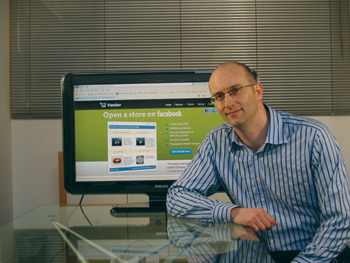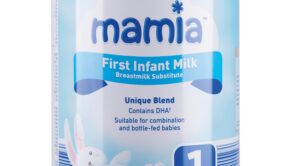Using Facebook to boost business

With businesses paying closer attention to how they can gain a tangible return from online social networking, Chris Small explains his new venture, VendorShop
19 April 2011
 Dublin-based start-up VendorShop provides a solution for businesses to drive direct revenue from their Facebook presence. VendorShop enables anyone with a Facebook page to add a free shop and to sell their products and services without customers having to leave the Facebook environment.
Dublin-based start-up VendorShop provides a solution for businesses to drive direct revenue from their Facebook presence. VendorShop enables anyone with a Facebook page to add a free shop and to sell their products and services without customers having to leave the Facebook environment.
The business was started just over six months ago and already, there are 10,000 Facebook stores using VendorShop to generate sales. “We’ve made it really simple for businesses and shoppers to use and that has been reflected in the uptake so far”, said Chris Small, director of VendorShop. “We have lots of great functionality coming on-stream in the next few weeks and months, so things will only get better from here”.
Huge opportunities abound
Facebook presents a huge opportunity for businesses to create a new revenue stream by enabling their fans to buy products directly from their Facebook page.
Businesses in the UK and Ireland have been slow in taking this step, says Small. “We have 10,000 businesses using our free Facebook shopping application, yet just a fraction of these are from Ireland and the UK”.
VendorShop only takes a few minutes to set-up. “You don’t have to understand anything about technology as all it takes is a couple of clicks and you have your page live. Within 10 minutes you could be selling a product,” says Small.
The solution has a range of features including special fan pricing and the ability to share products with friends to drive sales.
Emergence of Vendorshop
Small worked with a variety of retailers and other businesses over the years to help them develop their marketing strategies – including Laura Ashley, O2, GE Money, Wineport Lodge, One Direct and a range of SMEs. Having seen how businesses were struggling to monetise their social networking activity, he identified a need for a social network friendly shopping application that was simple and easy to use.
“Our official launch was in September but the core product that the business is based around – the social shopping net – was first lauched at the start of 2010 but we kept it under the radar as we got the product more robust and while we’re still obviously constantly developing it, we got to the point in September where we started to put our heads above water and get the word out there. As a consequence our numbers are growing.”
Word of mouth has really helped he says. “One of the great things about Facebook is the ability for people to ‘like’ your page and the leveraging of friends. Also there is a lot of activity that we didn’t know about – people who were using us to launch their Facebook shops and other people getting on to them asking how had they done that and they have referred them.”
Keeping it very simple is part of the premise to keep it very user friendly.
A lot of time spent on Facebook in the workplace
The only competitor to Vendorshop in the market at the moment is a company called Pavement Payment based in the US. It requires the shopper to download the application which VendorShop has avoided in its model.
Most companies already have Facebook pages but if a customer wants to buy an item it refers them back to the company website.
“People that use Facebook want to stay within Facebook and don’t want to move away so keeping it contained is very important.
“In my personal experience, businesses were saying that their staff were spending a lot of time on Facebook and they wanted to know how to make money from it.
“The vast majority of people – up to 68% – ‘like’ a buisiness page because they are interested in a product and want to find out about sales promotions so if I’m going to tell you about a product I might as well make it easy for you to buy it.”
Small says that each Facebook user has on average 130 friends. “If I’ve got 1,000 ‘likes’ on my business pages and I can activate those friends to friends of those 1,000 ‘likes’ then that’s 130,000 potential customers. All I’ve got to do is have the tools that allow me to get those people to put something on their wall like sharing a review or for someone to say they’ve just bought this product. Another thing we do is what we call, fan or like pricing, so if you are a fan we can create a differential price, say 20% off, if you are or become a customer.”
Setting up shop costs
The product is free at the moment and Small says that there will always be a free version of the product available. They will look to offer value added services around it to generate revenue. “We’ll work with other businesses to licence a premium version of the product. Companies will be able to access that premium version by buying individual tools that are appropriate for them but right now we’re not generating revenue but going forward that will change.”
Secure payment processing is provided by PayPal. Many different types of companies are already ing VendorShop to drive. A business in the United States is selling fresh chillies to consumers and industry, and World Vision Ireland launched its catalogue for Christmas via its Facebook page, and you can now give donations through the same process. Also Unilever is selling Pampers nappies and launching other products through Facebook.
“We have many businesses testing the e-commerce space. This is a really cheap way of starting that. They are not going to do massive sales straight away but by the end of the year they will see business picking up.”
The company is currently looking at external investment opportunities to help continue the growth of the business. To check it out go to www.facebookvendor.com or the Facebook page at www.facebook.com/vendorshop.



 Print
Print






Fans 0
Followers